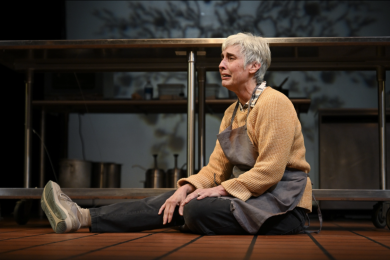Possession

What a week to see an Arthur Miller play. As the United States undergoes a drastic change in the Oval Office, Theatre in the Round Players (TRP) have begun a three-and-a-half-week run of Miller’s A View from the Bridge, the story of a volatile man who pretends ownership over women, the law, and anyone he doesn’t want to be in his country. So TRP’s staging of A View from the Bridge is timely. Especially bearing the inauguration in mind, theatergoers should feel inspired to wrestle with their beliefs about possession and power.
Written and set in the 1950s, A View from the Bridge takes place in the Carbone home, a snug, plain sliver of a Brooklyn tenement. The furniture, curated by prop designer Sharon Selberg, shows its years, and a few board games and a record player decorate the otherwise sparse set (by Toni Solie). The dining room soaks in light designer Kurt Jung and crew’s warm, orange lighting.
Inside the home, Eddie and Beatrice (Michael Egan and Roberta Gibbons) live with their 17-old-niece, Catherine (a fawning Aidan Jhane Gallivan). Catherine, an ambitious young adult, was orphaned long ago, but she enjoys a special bond with her uncle, blushing at his attention. Catherine’s relationship with her aunt is affectionate, too, but it comes off wildly more practical.
As the play unfolds, stolid mason Marco and blonde goofball Rodolpho arrive to stay with the Carbones. The brothers, respectively played by Don Maloney and Derek Dirlam (whose clowning nearly stole the first act, although I wasn’t convinced by his later, more serious scenes), are Beatrice’s cousins, undocumented immigrants from Italy. Catherine and Rodolpho’s mutual attraction sets the play — and Eddie’s ruin — in motion.
Spoiler alert
A View from the Bridge’s most attention-catching issue is incest, a bond between uncle and niece that threatens to burst the dam of family love and spill into taboo territory. I’d call the affection one-sided, since Catherine bats Eddie away when he makes a blatant move, but Gallivan’s Catherine still caresses her uncle even after their falling out.
Catherine’s fondness toward her uncle actually boggled my mind, especially after he made a move, and it made me wonder how I would’ve handled his inappropriate behavior. Did Catherine pretend Eddie’s assault never happened, maybe choosing to act like their relationship was in good shape when it wasn’t? Did she accept his behavior as the new normal? Was she too scared to leave him behind? I didn’t think she got enough time as subject (versus object of attention) for viewers to decide. But her situation begs the question: when a powerful man in our lives insists on having what he shouldn’t, how will we respond?
Overabundance and poverty
One of the play’s motifs was overabundance, which I found curious given the characters’ financial poverty. “You got too big a heart,” Eddie tells Beatrice before her cousins arrive. Neighborhood lawyer hints at Eddie’s “too much love for the niece.” And of course, the play’s stakes are enormous, with characters’ homes, careers, and even lives hanging in the balance. Meanwhile, the Carbone’s home remains exceedingly humble, almost serving as a reminder that even the poorest people’s lives have dreams, relationships, and weight.
Director Allen Hamilton is no stranger to Miller plays, having played Ben in the 1999 Broadway production of Death of a Salesman, which won the Tony Award for Best Revival. “You feel when Arthur Miller walks into the room that Chekhov, Shakespeare, [or] Ibsen walked in,” he told TRP before opening night. Perhaps out of respect, his production treated A View from the Bridge with steadfast fidelity. The actors rarely detoured from Miller’s copious stage directions and well-established characterizations. Beatrice is wise but deferential; Eddie affects strength but has no self-control around Catherine; Catherine means well but hasn’t had the chance to mature.
However, I wished TRP would’ve diverged somewhat and dropped the play’s framing device. Alfieri narrates the play with a series of monologues, introducing the Carbones and making speeches about Eddie’s fate. They’re usually lofty in tone, made even more ominous in TRP’s production by Ludovico Einaudi’s Svanire and Orbits playing overhead. But they add little substance to the play, mostly explaining events the audience can already infer. That said, to his credit, David Carey’s performance as the attorney came off both understanding and austere.
In today’s political moment, A View from a Bridge comes off as a powerful cautionary tale. Eddie wants what he can’t have, and he and his family pay the consequences. How will we respond to selfishness and inappropriate behavior in the next four years?




